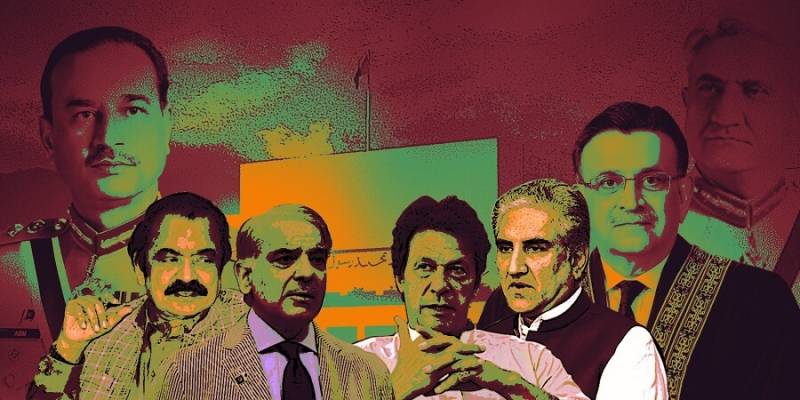
Wednesday will be marked as the last day of the 15th National Assembly of Pakistan. As the lawmakers bid adieu to the House, they do so knowing they are leaving the assembly at least four days earlier than required.
The last date for the fifth parliamentary year of the National Assembly is August 13, 2023, a day shy of the country's independence day.
In fact, Pakistan has a long history of dissolving its assemblies early owing to various reasons.
One major reason for dissolving the assemblies earlier than scheduled is the law that grants the authorities extra time to hold elections.
Under Article 224 of the Constitution, if any assembly is dissolved before completing its natural term, then elections are held within 90 days.
If the assembly naturally expires upon completion of its term, then the Election Commission of Pakistan (ECP) has to conduct polls within 60-day time.
This year, however, there is a possibility that elections could be delayed even further.
During a last-minute meeting of the Council of Common Interests -- where all provinces are equally represented by their chief executives -- it was decided that the digital population census held earlier this year has been approved. This means that the elections must now factor in the census as well, whereby constituencies will have to be redrawn.
As a result, some in the government say the general elections there is a possibility the polls could be delayed until March 2024 because the delimitation exercise will take more than four months.
Calling time early on assemblies
A look at the history of the parliament shows that this move by Prime Minister Shehbaz Sharif and the entire ruling coalition is not novel.
The practice of dissolving assemblies ahead of their scheduled date started all the way back, with the first assembly in 1954.
The then Prime Minister Khawaja Nazimuddin used his powers to dissolve the Assembly after Governor-General Ghulam Muhammad dismissed him.
In 1958, Governor-General Iskander Mirza dissolved the National Assembly and imposed martial law, leading to the first military takeover in Pakistan's history.
In 1977, former Prime Minister Zulfikar Ali Bhutto dissolved the National Assembly ahead of time and announced fresh elections amid allegations of rigging.
In 1988, President Ziaul Haq dissolved the National Assembly and announced new elections.
In 1990, President Ghulam Ishaq Khan used his powers to dissolve the National Assembly and announced new elections amid allegations of corruption and misuse of powers.
In 1993, President Ishaq Khan again dissolved the National Assembly, but the Supreme Court overturned the decision, and fresh elections were held.
In 1996, then-Prime Minister Benazir Bhutto dissolved the National Assembly, and fresh elections were held.
In 1999, the assembly was packed up after martial law was declared and the constitution abrogated.
However, subsequent assemblies, including those under Dictator General Pervez Musharraf, completed their term from 2002 to 2007, then from 2008 to 2013 and from 2013 to 2018.
The last date for the fifth parliamentary year of the National Assembly is August 13, 2023, a day shy of the country's independence day.
In fact, Pakistan has a long history of dissolving its assemblies early owing to various reasons.
One major reason for dissolving the assemblies earlier than scheduled is the law that grants the authorities extra time to hold elections.
Under Article 224 of the Constitution, if any assembly is dissolved before completing its natural term, then elections are held within 90 days.
If the assembly naturally expires upon completion of its term, then the Election Commission of Pakistan (ECP) has to conduct polls within 60-day time.
This year, however, there is a possibility that elections could be delayed even further.
During a last-minute meeting of the Council of Common Interests -- where all provinces are equally represented by their chief executives -- it was decided that the digital population census held earlier this year has been approved. This means that the elections must now factor in the census as well, whereby constituencies will have to be redrawn.
As a result, some in the government say the general elections there is a possibility the polls could be delayed until March 2024 because the delimitation exercise will take more than four months.
Calling time early on assemblies
A look at the history of the parliament shows that this move by Prime Minister Shehbaz Sharif and the entire ruling coalition is not novel.
The practice of dissolving assemblies ahead of their scheduled date started all the way back, with the first assembly in 1954.
The then Prime Minister Khawaja Nazimuddin used his powers to dissolve the Assembly after Governor-General Ghulam Muhammad dismissed him.
In 1958, Governor-General Iskander Mirza dissolved the National Assembly and imposed martial law, leading to the first military takeover in Pakistan's history.
In 1977, former Prime Minister Zulfikar Ali Bhutto dissolved the National Assembly ahead of time and announced fresh elections amid allegations of rigging.
In 1988, President Ziaul Haq dissolved the National Assembly and announced new elections.
In 1990, President Ghulam Ishaq Khan used his powers to dissolve the National Assembly and announced new elections amid allegations of corruption and misuse of powers.
In 1993, President Ishaq Khan again dissolved the National Assembly, but the Supreme Court overturned the decision, and fresh elections were held.
In 1996, then-Prime Minister Benazir Bhutto dissolved the National Assembly, and fresh elections were held.
In 1999, the assembly was packed up after martial law was declared and the constitution abrogated.
However, subsequent assemblies, including those under Dictator General Pervez Musharraf, completed their term from 2002 to 2007, then from 2008 to 2013 and from 2013 to 2018.

